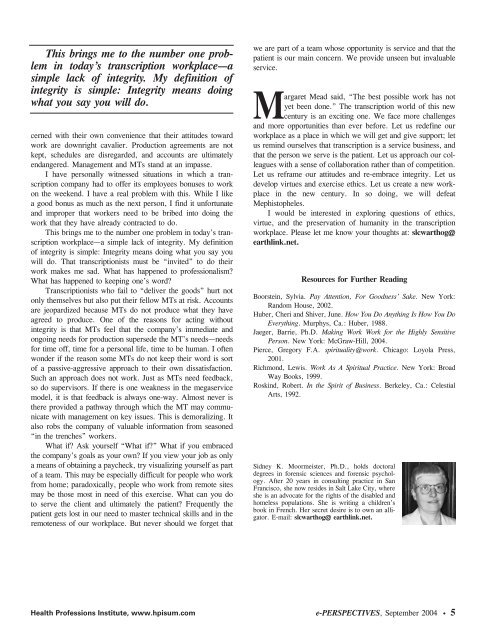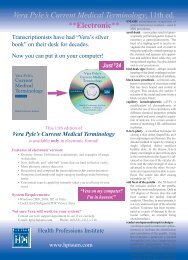on the Medical Transcription Profession - Health Professions Institute
on the Medical Transcription Profession - Health Professions Institute
on the Medical Transcription Profession - Health Professions Institute
You also want an ePaper? Increase the reach of your titles
YUMPU automatically turns print PDFs into web optimized ePapers that Google loves.
This brings me to <strong>the</strong> number <strong>on</strong>e problem<br />
in today’s transcripti<strong>on</strong> workplace—a<br />
simple lack of integrity. My definiti<strong>on</strong> of<br />
integrity is simple: Integrity means doing<br />
what you say you will do.<br />
cerned with <strong>the</strong>ir own c<strong>on</strong>venience that <strong>the</strong>ir attitudes toward<br />
work are downright cavalier. Producti<strong>on</strong> agreements are not<br />
kept, schedules are disregarded, and accounts are ultimately<br />
endangered. Management and MTs stand at an impasse.<br />
I have pers<strong>on</strong>ally witnessed situati<strong>on</strong>s in which a transcripti<strong>on</strong><br />
company had to offer its employees b<strong>on</strong>uses to work<br />
<strong>on</strong> <strong>the</strong> weekend. I have a real problem with this. While I like<br />
a good b<strong>on</strong>us as much as <strong>the</strong> next pers<strong>on</strong>, I find it unfortunate<br />
and improper that workers need to be bribed into doing <strong>the</strong><br />
work that <strong>the</strong>y have already c<strong>on</strong>tracted to do.<br />
This brings me to <strong>the</strong> number <strong>on</strong>e problem in today’s transcripti<strong>on</strong><br />
workplace—a simple lack of integrity. My definiti<strong>on</strong><br />
of integrity is simple: Integrity means doing what you say you<br />
will do. That transcripti<strong>on</strong>ists must be “invited” to do <strong>the</strong>ir<br />
work makes me sad. What has happened to professi<strong>on</strong>alism?<br />
What has happened to keeping <strong>on</strong>e’s word?<br />
Transcripti<strong>on</strong>ists who fail to “deliver <strong>the</strong> goods” hurt not<br />
<strong>on</strong>ly <strong>the</strong>mselves but also put <strong>the</strong>ir fellow MTs at risk. Accounts<br />
are jeopardized because MTs do not produce what <strong>the</strong>y have<br />
agreed to produce. One of <strong>the</strong> reas<strong>on</strong>s for acting without<br />
integrity is that MTs feel that <strong>the</strong> company’s immediate and<br />
<strong>on</strong>going needs for producti<strong>on</strong> supersede <strong>the</strong> MT’s needs—needs<br />
for time off, time for a pers<strong>on</strong>al life, time to be human. I often<br />
w<strong>on</strong>der if <strong>the</strong> reas<strong>on</strong> some MTs do not keep <strong>the</strong>ir word is sort<br />
of a passive-aggressive approach to <strong>the</strong>ir own dissatisfacti<strong>on</strong>.<br />
Such an approach does not work. Just as MTs need feedback,<br />
so do supervisors. If <strong>the</strong>re is <strong>on</strong>e weakness in <strong>the</strong> megaservice<br />
model, it is that feedback is always <strong>on</strong>e-way. Almost never is<br />
<strong>the</strong>re provided a pathway through which <strong>the</strong> MT may communicate<br />
with management <strong>on</strong> key issues. This is demoralizing. It<br />
also robs <strong>the</strong> company of valuable informati<strong>on</strong> from seas<strong>on</strong>ed<br />
“in <strong>the</strong> trenches” workers.<br />
What if? Ask yourself “What if?” What if you embraced<br />
<strong>the</strong> company’s goals as your own? If you view your job as <strong>on</strong>ly<br />
a means of obtaining a paycheck, try visualizing yourself as part<br />
of a team. This may be especially difficult for people who work<br />
from home; paradoxically, people who work from remote sites<br />
may be those most in need of this exercise. What can you do<br />
to serve <strong>the</strong> client and ultimately <strong>the</strong> patient? Frequently <strong>the</strong><br />
patient gets lost in our need to master technical skills and in <strong>the</strong><br />
remoteness of our workplace. But never should we forget that<br />
<strong>Health</strong> Professi<strong>on</strong>s <strong>Institute</strong>, www.hpisum.com<br />
we are part of a team whose opportunity is service and that <strong>the</strong><br />
patient is our main c<strong>on</strong>cern. We provide unseen but invaluable<br />
service.<br />
Margaret Mead said, “The best possible work has not<br />
yet been d<strong>on</strong>e.” The transcripti<strong>on</strong> world of this new<br />
century is an exciting <strong>on</strong>e. We face more challenges<br />
and more opportunities than ever before. Let us redefine our<br />
workplace as a place in which we will get and give support; let<br />
us remind ourselves that transcripti<strong>on</strong> is a service business, and<br />
that <strong>the</strong> pers<strong>on</strong> we serve is <strong>the</strong> patient. Let us approach our colleagues<br />
with a sense of collaborati<strong>on</strong> ra<strong>the</strong>r than of competiti<strong>on</strong>.<br />
Let us reframe our attitudes and re-embrace integrity. Let us<br />
develop virtues and exercise ethics. Let us create a new workplace<br />
in <strong>the</strong> new century. In so doing, we will defeat<br />
Mephistopheles.<br />
I would be interested in exploring questi<strong>on</strong>s of ethics,<br />
virtue, and <strong>the</strong> preservati<strong>on</strong> of humanity in <strong>the</strong> transcripti<strong>on</strong><br />
workplace. Please let me know your thoughts at: slcwarthog@<br />
earthlink.net.<br />
Resources for Fur<strong>the</strong>r Reading<br />
Boorstein, Sylvia. Pay Attenti<strong>on</strong>, For Goodness’ Sake. New York:<br />
Random House, 2002.<br />
Huber, Cheri and Shiver, June. How You Do Anything Is How You Do<br />
Everything. Murphys, Ca.: Huber, 1988.<br />
Jaeger, Barrie, Ph.D. Making Work Work for <strong>the</strong> Highly Sensitive<br />
Pers<strong>on</strong>. New York: McGraw-Hill, 2004.<br />
Pierce, Gregory F.A. spirituality@work. Chicago: Loyola Press,<br />
2001.<br />
Richm<strong>on</strong>d, Lewis. Work As A Spiritual Practice. New York: Broad<br />
Way Books, 1999.<br />
Roskind, Robert. In <strong>the</strong> Spirit of Business. Berkeley, Ca.: Celestial<br />
Arts, 1992.<br />
Sidney K. Moormeister, Ph.D., holds doctoral<br />
degrees in forensic sciences and forensic psychology.<br />
After 20 years in c<strong>on</strong>sulting practice in San<br />
Francisco, she now resides in Salt Lake City, where<br />
she is an advocate for <strong>the</strong> rights of <strong>the</strong> disabled and<br />
homeless populati<strong>on</strong>s. She is writing a children’s<br />
book in French. Her secret desire is to own an alligator.<br />
E-mail: slcwarthog@ earthlink.net.<br />
e-PERSPECTIVES, September 2004 • 5



